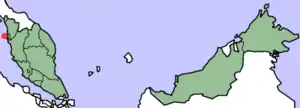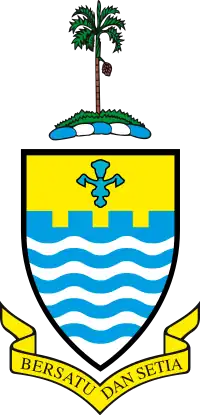Crown Colony of Penang
The Crown Colony of Penang was a British crown colony from 1946 to 1957. It came under British sovereignty after being ceded by the Sultanate of Kedah in 1786, and had been part of the Straits Settlements from 1826 to 1946.[1] Together with Singapore, it became a crown colony under the direct control of the British Colonial Office in London until it was incorporated into the Malayan Union.[2]
Crown Colony of Penang | |||||||||
|---|---|---|---|---|---|---|---|---|---|
| 1946–1957 | |||||||||
| Anthem: God Save the King (1946–1952) God Save the Queen (1952–1957) | |||||||||
 Location of Penang | |||||||||
| Status | Crown colony | ||||||||
| Capital | George Town | ||||||||
| Common languages | |||||||||
| Government | Colonial Office | ||||||||
| Monarch | |||||||||
• 1946–1952 | George VI | ||||||||
• 1952–1957 | Elizabeth II | ||||||||
| Resident-Councillor | |||||||||
• 1946–1948 | Sydney Noel King | ||||||||
| Historical era | Post-war · Cold War | ||||||||
• Dissolution of the Straits Settlements | 1 April 1946 | ||||||||
• Independence from the United Kingdom | 31 August 1957 | ||||||||
| Currency | Malayan dollar | ||||||||
| |||||||||
| Today part of | Malaysia | ||||||||
The British East India Company gained Penang in 1786 and established a trading post.[3] It was ceded by the Sultan of Kedah to ensure the former's protection against the threat posed by its Siamese and Burmese neighbors.[4] It was transformed into a Crown Colony, substituting state for company control through the Straits Settlement 1867.[3] During World War II, it was occupied by the Japanese from 1942 to 1945.
After the post-war dissolution of the Straits Settlements Penang and Malacca become crown colonies in the Federation of Malaya, while Singapore became a standalone crown colony, separate from Malaya.[5] In 1955, Tunku Abdul Rahman held a meeting with the British to discuss the end of British rule in Penang with a merger with Malayan Union (which was then replaced by Federation of Malaya). On 31 August 1957, when Malaya achieved its independence from the United Kingdom, Penang was integrated as a state of the federation, which later known as Malaysia when it merged with other territories in British Borneo.[6]
References
- A. GUTHRIE (of the Straits Settlements, and OTHERS.) (1861). The British Possessions in the Straits of Malacca. [An Address to the Secretary of State for the Colonies, Signed by A. Guthrie and Others, and Dated April 20th, 1861, in Reference to the Transfer of the Administration of the British Possessions in the Straits of Malacca to the Colonial Office.]. pp. 1–.
- Ooi, Keat Gin (2004). Southeast Asia: A Historical Encyclopedia, from Angkor Wat to East Timor. Santa Barbara, CA: ABC-CLIO. p. 1049. ISBN 1576077705.
- Kratoska, Paul H. (2001). South East Asia, Colonial History: Imperial decline: nationalism and the Japanese challenge (1920s-1940s), Volume 4. London: Taylor & Francis. p. 89. ISBN 0415215439.
- Graham, Penny F. (1 March 2015). Whatever Remains: A true story of secret lives and hidden families. Big Sky Publishing. ISBN 9781925275032.
- "The Straits Settlements is Dissolved". National Library Board, Singapore. 1 April 1946. Retrieved 16 July 2016.
- Cheah Boon Kheng (June 2009). "The Communist Insurgency in Malaysia, 1948–90: Contesting the Nation-State and Social Change" (PDF). National University of Singapore. New Zealand Journal of Asian Studies. p. 133/2. Retrieved 18 October 2015.
.svg.png.webp)

_(2022).svg.png.webp)